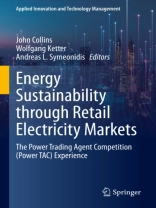The world is moving away from demand-driven electricity markets supplied by centralized generation and distribution of fossil-fuel-produced electricity. Increasing reliance on weather-dependent renewable sources will require a shift toward a supply-driven paradigm, while beneficial electrification, including widespread adoption of electric vehicles, heat pumps, and batteries will offer considerable but widely distributed demand flexibility that can be used to compensate for supply variability. The open-source Power Trading Agent Competition (Power TAC) platform simulates a decentralized future, modeling the high complexity of future retail electricity markets.
This book describes a variety of approaches to profitable trading in realistic wholesale and retail electricity markets. It presents actionable insights from extensive exploration of policies and business models for retail electricity markets gained from a decade of Power TAC tournaments, and from research inspired by the Power TAC experience. Featuring contributions from tournament designers, competitors, and scientists combining best practices from computer science and economics and management science, this book is of benefit to academics, researchers, practitioners and policy makers in sustainable energy and wholesale and retail electricity markets.
Jadual kandungan
Introduction (Collins).- Modeling a customer population in Power TAC: Electric Vehicle Chargers (Collins).- Vidyut Vanika: AI-Based Autonomous Broker for Smart grids – From Theory to Practice (Chandlekar).- Designing Retail Electricity Tariffs Using Reinforcement Learning (Naseri).- Nudging the Direction of Energy Tariff Selection: Lessons Learned from an Attribute Framing Experiment with Temporal Construal Levels (Rook).- Agent UDE: A Smart Broker Agent for Autonomous Power Trading (Unland).- Upgrading a winning agent to not winning: the case of Agent Mertacor in Power TAC (Makrodimitris).- SPOT: Strategies for Power Trading in Wholesale Electricity Markets (Morshed, Chowdhury).- Crocodile Agent: A decade of competing in the Power Trading Agent Competition (Podobnik).- Incorporating Social Values for Cooperation in Energy Trading and Balancing Research (Rook).- Smart Market-driven Virtual Power Plants of Shared Electric Vehicles (Kahlen).- Power TAC Experiment Manager: Support for empirical studies (Collins).
Mengenai Pengarang
John Collins is a retired Lecturer in Computer Science and Software Engineering at the University of Minnesota, and a District Director of a Rural Electric Cooperative in Wisconsin. His research has focused on autonomous agents interacting in simulated markets, and on finding and demonstrating economic mechanisms that can contribute to a sustainable energy future. He is co-founder of the Power Trading Agent Competition (Power TAC) project with Wolfgang Ketter, as well as principal architect and project lead on the project.
Wolfgang Ketter is Chaired Professor of Information Systems for Sustainable Society at the Faculty of Management, Economics, and Social Sciences at the University of Cologne, Germany. In addition, he is the coordinator of the Key Research Initiative “Sustainable and Smart Energy and Mobility” where research he leads focuses on how digital transformation can create a faster and more stable transition to sustainable energy and mobility. He also is professor of Next Generation Information Systems at the Department of Technology and Operations Management, and Director of the Erasmus Centre for Future Energy Business at the Rotterdam School of Management, Erasmus University. He has served as Editor for Information Systems Research and MIS Quarterly. Since 2017 he is advisor to the German government on energy policy and since 2018 a fellow of the World Economic Forum Global Future Council on Mobility. He is also co-founder of the Power Trading Agent Competition (Power TAC; www.powertac.org) project with John Collins. He has won many prestigious awards, such as the AIS Impact Award 2020, the INFORMS Wagner Prize Finalists Award 2020, the INFORMS ISR Best Paper Award for 2020, the INFORMS Information Systems Society – Design Science Award (2012 and 2021), the AIS Ciborra Award 2022, and the INFORMS Information Systems Society – Practical Impacts Award 2022.
Andreas L. Symeonidis is a Professor with the Department of Electrical and Computer Engineering at the Aristotle University of Thessaloniki, Greece and the Head of Research at Cyclopt.com. His research interests include Software engineering processes, Model-driven engineering, Software quality and Software analytics, Middleware Robotics and Knowledge extraction from big data repositories. Dr. Symeonidis’ work has been published in over 200 journal articles, book chapters, and conference publications. He is co-author of the books “Agent Intelligence through Data Mining” (Springer publishing), “Mining Software Engineering Data for Software Reuse” (Springer publishing) and “Practical Machine Learning in R” (Leanpub publishing). He is currently coordinating more than 10 contract R&D projects, while serving occasionally as a R&D project evaluator and reviewer for the European Commission. More at: http://users.auth.gr/symeonid.












